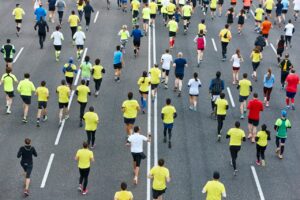Running, one of the oldest and most universal forms of human physical activity, has become a global phenomenon, celebrated by marathons that bring together participants from all walks of life. From its ancient origins to the present day, running has undergone a remarkable transformation, and marathons have become a symbol of endurance, community, and personal achievement.
Running as a form of exercise and competition dates back to ancient civilizations. The earliest recorded evidence of competitive running can be found in Ancient Greece, where it was the centerpiece of the Olympic Games held in Olympia from 776 BC. The Greeks believed that running was not only a test of physical endurance, but also a way to honor the gods.
One of the most famous legends associated with running is that of Phidippides, a Greek messenger who, according to Herodotus, ran about 25 miles from the battlefield of Marathon to Athens to report the Greeks’ victory over the Persians in 490 BC. This legendary race is often cited as the inspiration for the modern marathon distance.
The modern marathon as we know it began to take shape in the late 19th and early 20th centuries. The marathon distance of 26.2 miles (42.195 km) was standardized during the 1908 London Olympics. The distance was set to cover the route from Windsor Castle to the Olympic Stadium in London, with the finish line located in front of the royal box.
The first modern marathon race was organized as part of the first Olympic Games in Athens in 1896, paying homage to the legendary race of Pheidippides. The race was a resounding success and laid the groundwork for the marathon to become a key event in athletics.
Over the years, marathons have grown in popularity and major races have been held in cities around the world. These races attract not only elite athletes, but also recreational runners, charity fundraisers and those seeking personal achievement.
Several marathoners have left an indelible mark on the sport, inspiring countless others to take up running and pursue their own marathon dreams. Here are a few of the most famous marathoners:

Marathons have become much more than a test of physical endurance; they are cultural events that bring together communities and promote health, fitness, and camaraderie. Major marathons such as the Boston Marathon, New York City Marathon, and London Marathon attract tens of thousands of participants and millions of spectators each year.
Key Aspects of Marathon Culture:
Marathon training itself has evolved into a comprehensive discipline, with a focus on proper nutrition, hydration, and injury prevention. Runners often follow detailed training plans, participate in running clubs, and use technology to monitor their progress.
Marathons continue to grow in popularity, with new races popping up all over the world and more and more people embracing running as a way of life. The sport has a rich history and a vibrant present, with each marathon serving as a testament to human endurance, determination and the joy of running.
From Ancient Greece to modern cities around the world, the spirit of marathon running continues unabated, inspiring generations of runners to lace up their shoes and hit the sidewalk in pursuit of personal and communal achievement. Discover the wonderful world of health and beauty with running!